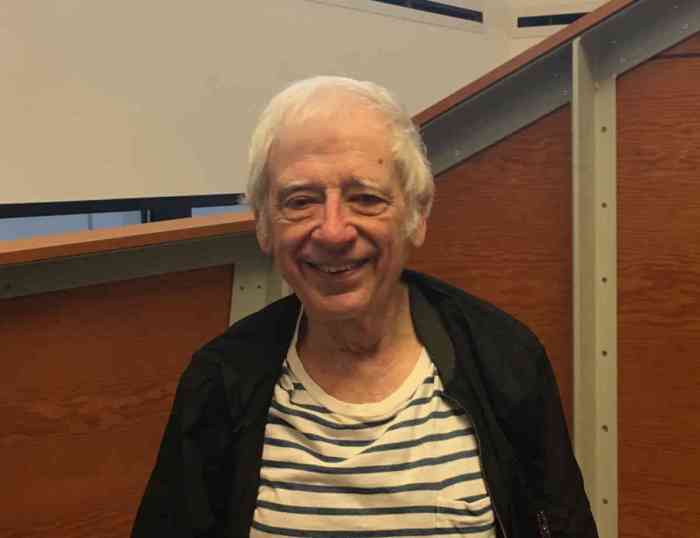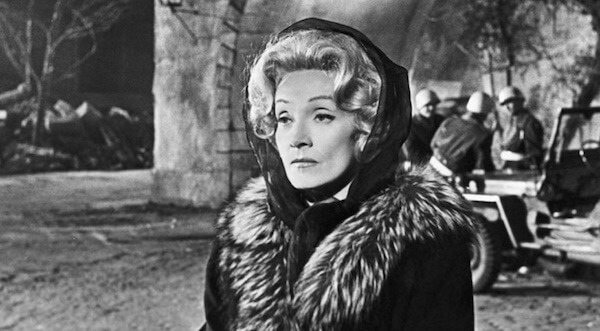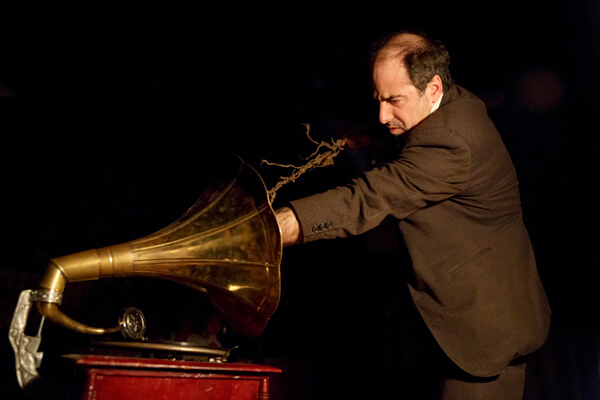Larry Pine and Vincent Kartheiser in Mike Bencivenga's “Billy & Ray,” directed by Garry Marshall. | CAROL ROSEGG
BY DAVID KENNERLEY | Judging from the poster alone, you might think that “Billy & Ray,” the earnest melodrama now at the Vineyard Theatre, is a love story about a squabbling gay couple in the 1940s. Not quite.
The fact-based play, written by Mike Bencivenga, serves up the rocky backstory behind producing “Double Indemnity,” which many credit as the first film noir. A noble idea — the 1944 thriller starring Barbara Stanwyck, Fred MacMurray, and Edward G. Robinson ranks 29th on the 2007 American Film Institute’s list of 100 best American films of the 20th century.
The Billy in question is Hollywood director Billy Wilder (Vincent Kartheiser) and Ray is hard-boiled detective story author Raymond Chandler (Larry Pine). The unlikely pair is charged with creating an original screenplay based on a tawdry potboiler about murder, greed, and lust in an era when the Hollywood production code had strict rules about depicting unsavory behavior.
Behind-the-scenes melodrama about 1940s Hollywood fails to get the heart racing
No, the men are not gay, but during the arduous creative process under pressure from studio executive Joe Sistrom (Drew Gehling), their stormy relationship begins to resemble that of an old married couple who, deep down, have an abiding affection for each other. The ampersand in the title is well placed.
Legendary director Garry Marshall clearly has a feel for truculent, mismatched duos — after all, he changed television forever with comic favorites like “The Odd Couple,” “Laverne & Shirley,” and “Mork & Mindy.”
Yet he fails to get a solid grip on the flaccid “Billy & Ray,” which is not primarily a comedy. The piece is intentionally presented in the same moody noir style as “Double Indemnity” itself — set in a drab office tucked away in a corner of Paramount Studios, where the men labor to produce “pages,” hoping to placate the head honchos lest the project be scrapped. At the reception desk there’s a pert, wisecracking blonde (a stylish Sophie von Haselberg, who recalls a young Bette Midler because, well, she’s her daughter), whose main job is to serve the men bagels and martinis (Ray insists he is on the wagon but falls off soon enough.)
And yes, the climax takes place on a dark and stormy night with exaggerated shadows.
Many elements in “Double Indemnity” are echoed in the play. In the movie, the killers are revealed early on. As Billy says, “This is not a who done it. It’s more of a why done it. And a how they done it.” The same could be said about “Billy & Ray.” The chief dramatic tension would normally center on whether or not they actually get the movie made and if it will be any good. Since we already know the answer, the play focuses on why and how it got made, in the form of a character study of these quite disparate men.
Problem is, unlike the movie, there’s just not enough intensity. The action sags — it’s missing a compelling dramatic arc.
It doesn’t help that the performances are uneven. Pine, who won accolades for Harvey Fierstein’s “Casa Valentina” last season, is engaging as the meticulous, pipe-smoking author battling both Billy and alcoholism. Gehling and von Haselberg do their best to flesh out their stock characters. But television actor Kartheiser, known for playing smarmy Pete Campbell in “Mad Men,” struggles in the demanding role of Billy. His portrayal feels tentative, and his Austrian accent — tough for even seasoned stage actors to pull off without seeming hackneyed — gets in the way.
The play is at its best when imparting fascinating tidbits about the movie’s development. The first writer, Billy’s regular partner, left in a huff and was replaced by a reluctant Ray, a former schoolteacher with zero screenwriting credits. Billy, who is Jewish, fled from Austria for a chance at a better life, but left behind his family, who were exterminated by the Nazi regime.
The ending of “Double Indemnity” was changed after initial screenings because Billy felt the original one was overkill. It was nominated for seven Academy Awards and did not win a single one because the studio bigwigs instead pushed the upbeat, family-friendly “Going My Way,” starring Bing Crosby as a crooning priest.
“Billy & Ray” offers some savvy comic touches. When Ray says they need to be subtle about the adultery and murder to circumvent the censors, Billy replies, “Subtleties are fine. As long as we make them obvious.”
While the play attempts to detail the plot of “Double Indemnity,” there’s no denying it resonates more for those who have actually seen the movie. And if you haven’t seen it, you’ll want to rush home and check it out on Netflix.
BILLY & RAY | Vineyard Theatre, 108 E. 15th St. | Through Nov. 23: Tue.-Wed. at 7 p.m.; Thu.-Sat. at 8 p.m.; Sat.-Sun. at 3 p.m. | $70 at VineyardTheatre.org or 212-353-0303 | Two hrs., 10 mins., with intermission



































